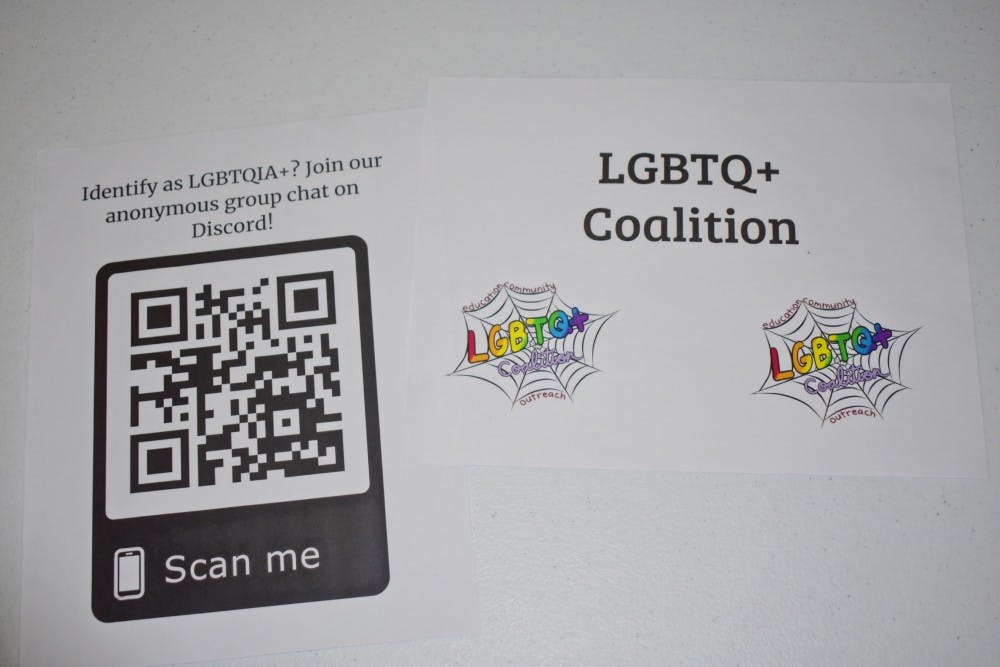University of Richmond students gathered for a Queer Ally Workshop, where panelists answered questions about LGBTQ+ life, in the Whitehurst Living Room at 7 p.m. on March 28.
The LGBTQ+ Coalition, previously named Students Creating Opportunities, Pride and Equality (SCOPE), initiated the workshop. Students submitted questions online to the panelists for two weeks leading up to the event. Attendees also had the chance to submit questions by writing them on papers passed out at the beginning of the event.
“The original idea came from many organizations asking us to go to their meetings and tell them about how to be a good ally,” said junior Jeff Lowe, president of The LGBTQ+ Coalition. “It would be a lot of work if we go to each individual meeting, so we decided to have a workshop.”
Panelists included both faculty members and student leaders: Fernando Gomez, the director of biological instruction; senior Cory Schutter, a women, gender and sexuality studies major; Ladelle McWhorter, Stephanie Bennett-Smith Chair in women, gender, and sexuality studies; the Rev. Jamie Lynn Haskins, chaplain for spiritual life; sophomore Liam Lassiter, treasurer of The LGBTQ+ Coalition; senior Dominique Harrington, co-founder of Shades of Pride; and senior Kylie Britt, president of the WILL* program.
Lowe and sophomore Samantha Burns, community outreach chair of The LGBTQ+ Coalition, served as moderators.
One of the first questions students submitted was: “Why so many letters in the acronym LGBTQIA? Why can’t you just say 'the gays'?"
Lassiter answered that the acronym was important because it implied that there was more than sexuality and attraction in the LGBTQIA community.
Britt added that the acronym brought lesser-known identities to the forefront.
"It brings visibility to the identities other than gays and lesbians," she said.
The term LGBTQIA stands for lesbian, gay, bisexual, transgender, queer, intersex and asexual, but includes other communities as well.
Students were also curious about how to be a good ally and the best way to react if a friend came out to them.
Haskins said allies should be the people who called out homophobic behaviors even before LGBTQ+ people did.
Enjoy what you're reading?
Signup for our newsletter
As an ordained minister and a queer person, Haskins said she had dealt with many negative attitudes from religious people. She remembered the best response she had gotten when she had come out to someone was, “Congratulations.”
“[Coming out] should be a thing to be celebrated," Haskins said, "and it’s a thing to find joy in when you are in safe spaces."
After the experience, she decided to congratulate people who came out to her.
Harrington said it was important to always be respectful to people's identities when they made the choice of coming out.
Another audience question, “Is being gay or transgender a choice?” was met with, "Does it matter?" from Gomez.
“To even ask if that is a choice, it's placing restrictions on my identity as someone who lives to the fullest of who I am," Haskins said. "So if you are asking, you are limiting my value.”
Lassiter said: “It’s definitely not a choice. Because why would I be willingly going to a bathroom where people are looking at me weirdly? Why would I choose an identity that increases my mortality, gives me a greater chance to have mental illness?”
Haskins added that the question was usually asked with the intention of delegitimizing LGBTQ+ peoples' identities. Therefore, people should be mindful when asking such questions.
When asked what could be done to make UR more inclusive, the panelists agreed that there should be more push from the school for a queer-friendly environment.
Lassiter suggested that, first, professors could be part of this change.
“Professors should be very intentional about what they discuss, and especially the examples they use in class,” Lassiter said.
He said it would also be helpful for professors to include pronouns as part of their introduction in the first day of class.
“It’s weird to be the only person to say pronouns when introducing myself," Lassiter said. "So this could be very validating for me."
Junior Sara Milano, who attended the event, agreed that being intentional is key. She also said that hearing from the LGBTQ+ community was important, and something the campus lacked.
In this sense, Milano thought the workshop served its purpose.
When reflecting about what he wanted people to get out of the workshop, Lowe said he had wished people could ask questions that they were afraid to ask for fear of making others uncomfortable, and to have enough information to be comfortable around queer people.
In a follow-up email sent out by The LGBTQ+ Coalition, Lowe wrote that the organization had decided the Queer Ally Workshop would become an annual event.
Contact news writer Haley Zhao at haley.zhao@richmond.edu.
Support independent student media
You can make a tax-deductible donation by clicking the button below, which takes you to our secure PayPal account. The page is set up to receive contributions in whatever amount you designate. We look forward to using the money we raise to further our mission of providing honest and accurate information to students, faculty, staff, alumni and others in the general public.
Donate Now



